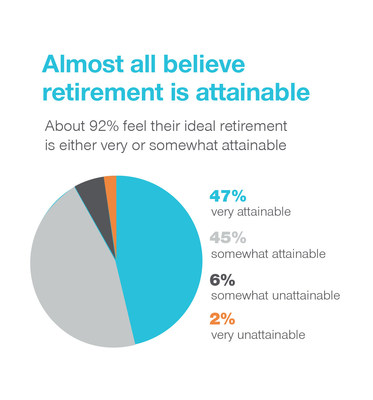T. Rowe Price STUDY: Nearly Half of Pre-Retirees Feel Their Ideal Retirement is 'Very Attainable'

Two Retirement Themes Emerge: A Time for Reinvention or Relaxation?
The
"It's great to see that most people have positive perceptions of this next chapter in their life and that they believe their dreams are attainable," says
While investors' retirement philosophies did not differ by generation, education, or marital status, there were some significant differences when it came to gender. In addition, the study found that generational differences exist as it relates to longevity and financial planning habits.
Men and Women Differ on Retirement Philosophy
- Men (40%) were more likely than women (36%) to describe their retirement years as a time to relax and indulge.
- Men (50%) were more likely than women (44%) to say their ideal retirement was very attainable.
- Women (76%) were more likely than men (64%) to list traveling as part of their ideal retirement.
"Men and women often-times have different views of retirement," says Ward. "I always recommend that couples take a moment to think about what retirement would look like. Write down your visions separately, and then compare notes. If the two versions are very different, it's time to talk."
Longevity Bonus: A Blessing or a Curse?
- The study also looked at emotions around longevity in retirement. Americans are living longer and with an increased life expectancy, many will have an extra 30 years of retirement for which they need to plan. Respondents had mixed emotions on whether these additional years were a positive or a negative.
- More than half (55%) of respondents said an additional 30 years of life would be "both a blessing and a curse," noting potential health issues during the later years may outweigh the benefits of living longer.
- Gen Xers (37%) were more likely to label it a blessing compared with baby boomers (29%).
- 45% of respondents were skeptical about the idea of an extra 30 years of life, while 35% were optimistic and 26% were excited.
- Gen Xers (73%) were significantly more likely to say the "longevity bonus" would impact how they plan and save for retirement than baby boomers (62%). Both cited they would need to work longer in order to save more money.
Financial Habits Differ by Generation
- The extent to which investors review their accounts intensifies with age. About 57% of 36—49 year olds said they reviewed their investment accounts at least once a month. That number jumped to 66% for investors in the 60—64 year age group.
- Gen Xers (43%) were more likely than baby boomers (24%) to say online investment platforms and apps have changed the way they approach investing.
- Gen Xers (82%) were more likely to say they could be doing more to prepare for their retirement than baby boomers (55%). For both groups, those who feel like they could be doing more cite not having enough money or time as reasons holding them back.
For the full report of findings, visit
ABOUT THE SURVEY
This
ABOUT
Founded in 1937,
To view the original version on PR Newswire, visit:http://www.prnewswire.com/news-releases/t-rowe-price-study-nearly-half-of-pre-retirees-feel-their-ideal-retirement-is-very-attainable-300411580.html
SOURCE
News Provided by Acquire Media

